Emergency Dentist – Long Island City, NY
We Accommodate Dental Emergencies Fast
Dental emergencies can be sudden and frightening – what’s worse is that they always seem to happen at the most inconvenient times possible for patients and their families. If you’re experiencing a severe oral injury and/or pain and are located in the greater Long Island City area, don’t hesitate to contact LIC Dental Associates. We make time for emergency dentistry in Long Island City as soon as possible. With a team of highly qualified dentists standing by, even specialty care is never far away when you need it most.
Why Choose LIC Dental Associates for Emergency Dentistry?
- Same-Day Appointments Available
- Dedicated Team of Specialists
- Compassionate & Friendly Staff
How We Treat Dental Emergencies

- Same-Day Appointment: Whenever possible, we’ll see you on the same day that you call our office with an urgent dental issue. While you’re waiting for your appointment, be sure to follow any first-aid advice provided by our team.
- Emergency Exam: Before anything else, we’ll need to complete an examination of your mouth. This will allow us to identify what’s causing the problem. It will also give us an idea of how severe your dental emergency truly is.
- Review Findings: We will explain what we found during our examination and make sure that you understand what’s going on inside your mouth. After that, we will give you our recommendations for treatment.
- Get the Care You Need: Emergency dental care can involve a wide number of treatments, from a dental crown to a root canal treatment to a tooth extraction. Whatever your smile needs, you can count on us to do whatever it takes to resolve your pain and protect the health of your smile.
The Most Common Dental Emergencies
Some dental emergencies are the result of accidents and facial trauma while others are caused by oral care neglect. Regardless of what kind of emergency you’re suffering from, our team will work quickly to figure out the best method of treatment. Check below to see some of the emergencies that we can help you with.
Understanding the Cost of Emergency Dentistry

Having to deal with the sudden, unexpected cost of treating a dental emergency can be stressful, but fortunately, our team is ready to help you get the care you deserve without breaking the bank. We’ll always be transparent regarding the cost of any treatments you might need, and we’ll make sure you’re fully aware of your options for payment. Below, you’ll find the basics of what you should know regarding the cost of emergency dentistry.
Every Dental Emergency is Different

You won’t know for sure how much you can expect your emergency dental care to cost until our team has had a chance to examine your smile. After we’ve determined the nature and severity of your specific oral health issue, we’ll give you our recommendation for treatment as well as an estimate of the overall price. Whether you need a simple filling or a more complex form of dental care, you can count on us to give you an accurate idea of what you’ll end up paying.
Does Dental Insurance Cover Dental Emergencies?
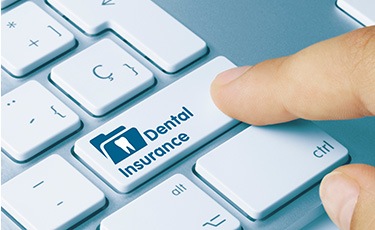
Generally, yes, dental insurance often does indeed offer coverage for many of the services that might be recommended to treat a dental emergency. This includes a wide range of restorative treatments, which are often eligible for about 50% to 80% coverage depending on the type of service and the specifics of your plan. On top of that, it’s not uncommon for dental insurance to pay for at least one emergency appointment per year.
Bear in mind, though, that not all dental insurance policies are exactly the same. It’s important to get in touch with your insurance provider to clarify the details of your coverage before you commit to any treatments. If you need additional help understanding your benefits, our team will gladly review them with you.
Other Options for Making Dental Emergencies Affordable

If you don’t have dental insurance, it’s still possible for you to save money on emergency dental care by signing up for our LIC Dental Associates Perks Program. The many benefits offered by this program include two emergency visits per year, along with 10% discounts on any necessary procedures.
Alternatively, our team can help you apply for financing through CareCredit and LendingClub. With the right financing plan, you can break up the cost of your care into smaller installments that don’t put as much strain on your budget.
Taking Care of Your Smile Can Save You Money

The most affordable type of dental emergency is one that never happens in the first place! By being proactive about taking excellent care of your smile, you can significantly reduce your risk for dental issues that could eventually turn into emergencies. Be sure to practice excellent oral hygiene by brushing and flossing at least twice every day. Also, don’t forget to make room in your schedule to visit our office at least two times a year for routine checkups and cleanings.
Tips for Preventing Dental Emergencies

Our team is more than prepared to provide you with the urgent emergency dental care you require should a situation arise, but we would much rather help preserve and protect your smile to save you from pain and stress. With a good at-home and professional oral hygiene routine, you can not only save your wallet from the cost of emergency dentistry in Long Island, but also your time! Read more about how to protect your smile from issues by clicking on the button below.
Visit Your Dentist Every Six Months
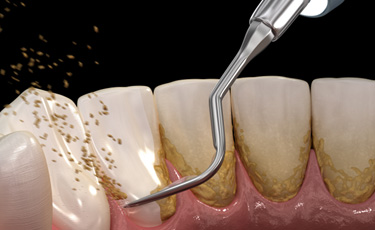
The American Dental Association, as well as our team at LIC Dental Associates, recommends visiting your dentist every six months for a routine checkup and cleaning. These regular visits are important for keeping plaque and tartar from accumulating, as well as diagnosing and treating any small problems before they’ve had a chance to progress.
Maintain a Good Oral Hygiene Routine at Home

In addition to professional bi-annual cleanings from a dental hygienist, it’s also important to build a good oral hygiene routine at home. This includes brushing for two minutes with fluoride toothpaste twice a day, flossing at least once daily, and rinsing every day with antibacterial mouthwash. This will help keep cavities at bay and prevent food debris, plaque, and tartar from accumulating along your gumline.
Eat a Balanced Diet

What you eat can also impact your oral health. A diet that contains a lot of processed foods that are high in carbohydrates, like starch and sugar, can lead to an increased risk of cavities and even tooth infections. By balancing your diet with fresh fruits and vegetables, as well as other foods that are naturally good for your teeth, like celery, you can reduce your risk of these common dental concerns.
Wear a Mouthguard for Protection
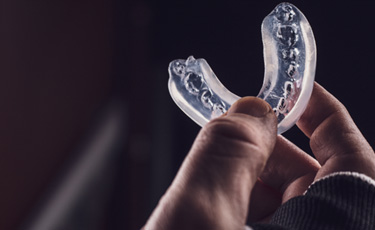
Do you play sports or grind your teeth at night? The force of grinding or trauma caused by a ball hitting your face can lead to a knocked-out, cracked, or chipped tooth. Investing in a customized athletic mouthguard or nightguard can help drastically minimize your chances of these types of dental emergencies from happening.
Don’t Use Your Teeth as Tools

If you regularly use your teeth to open packages or as a tool to do other tasks, you’re increasing your chances of damaging a tooth tenfold. Although it may be slightly less convenient to grab a tool instead of using your mouth, doing so can save you from having to pay a hefty dental bill.
Root Canals
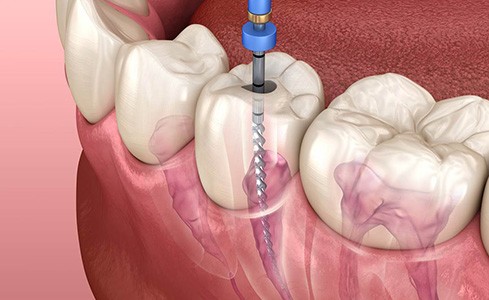
Root canal treatment may have a “scary” reputation, but truthfully, this procedure can be a saving grace for patients with advanced dental infections. Our dentists will carefully access the affected tooth’s inner chamber with special instruments and remove diseased pulp and bacteria from within, replacing it with a safe, biocompatible substitute. This procedure has a success rate of over 95%, and many treated teeth are able to remain safely in patients’ smiles for years to come.
Tooth Extractions
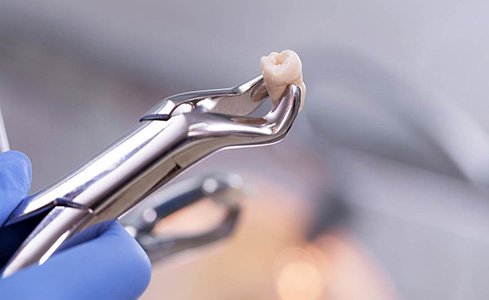
Extracting one or more natural teeth is never an ideal outcome for our doctors – we strive to preserve healthy dental structures whenever possible for each valued patient. However, there are situations where this approach is best for your health and safety, such as when advanced tooth decay or a traumatic injury has occurred. Rest assured that we will handle this procedure as smoothly as possible, providing sedation dentistry when necessary to help the patient feel genuinely at ease. If the extracted tooth or teeth require replacement, our experts can start this process immediately so that any time spent without a complete, confident smile is very minimal.
Dental Emergency FAQs
When Should I Go to the Emergency Room Versus the Dentist’s Office?
Anytime you are experiencing continual bleeding, increased swelling that will not go down, or you have a fractured or broken jaw, it is best if you get to your local emergency room for immediate medical assistance. Otherwise, your emergency dentist will be the best person to treat your problem. Here’s why:
- You will have a shorter wait time.
- Dentists are licensed and have the educational and professional background and knowledge to treat both the symptoms and the root cause.
- You will receive start-to-finish care that includes a personalized treatment plan for improving your smile.
What If My Toothache Goes Away? Should I Still Make an Appointment?
A toothache can arise for a variety of reasons. If something is stuck between your teeth and can be dislodged at home with dental floss, it is likely the pain will go away, and you will be fine to resume your normal activities. However, if nothing is lodged between your teeth and your toothache still goes away after a few days, it is best if you schedule an appointment to see us. Our dental team can examine your smile to determine if there might be an underlying issue that should be remedied quickly.
What Can I Do to Better Manage Pain in the Meantime?
If you’re waiting to get in to see one of our dental experts, there are a few things you can do at home to manage the pain you’re experiencing. First, make sure to take an over-the-counter pain reliever. Second, apply an ice pack or cold compress to the problem area. This will not only decrease any discomfort you’re feeling but also reduce swelling.
How Will I Know If Insurance Will Cover My Emergency?
Most dental insurance companies are willing and able to cover your dental emergency, but it does often depend on the type of restorative care you need to fix the problem. You’ll need to review your policy to find out how much your insurance company will agree to pay as well as how much your out-of-pocket expenses will be. In most cases, insurers will cover between 70-80% of minor services (i.e. fillings) and 50-70% of major services (i.e. dental crowns, root canals).
If you are unsure what to ask or how to go about finding out if you are covered, let a member of our dental staff help. We can assist in getting the answers you need while making sure your out-of-pocket expenses remain low.
Preventive Dentistry Restorative Dentistry Dental Implants Cosmetic Dentistry Periodontal Therapy TMJ Therapy Sedation Dentistry Dental Technology Pediatric Dentistry View Our Services
